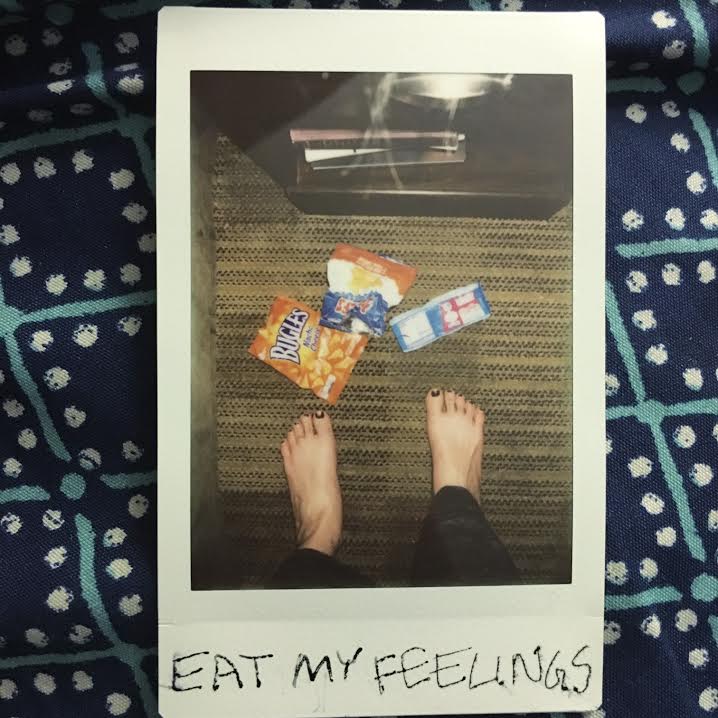Myths of Men
 I am a myth-maker; I make myths of men. My journals and essays and mental spaces are filled with names like Jared, Jeter, and Jefferson, all of them monsters I tried to tame with a pen. My version of myth-making is a form of self-deception. I don’t do this on purpose. It’s a defective coping mechanism—a way to withstand unbearable situations, like drinking to warm yourself on a cold night. You may fool your brain into thinking your body is warm, but it doesn’t stop your body from developing frostbite. These myths may pacify my terror around abusers, but they don’t stop the abuse.
I am a myth-maker; I make myths of men. My journals and essays and mental spaces are filled with names like Jared, Jeter, and Jefferson, all of them monsters I tried to tame with a pen. My version of myth-making is a form of self-deception. I don’t do this on purpose. It’s a defective coping mechanism—a way to withstand unbearable situations, like drinking to warm yourself on a cold night. You may fool your brain into thinking your body is warm, but it doesn’t stop your body from developing frostbite. These myths may pacify my terror around abusers, but they don’t stop the abuse.
This is where the perennial truth versus fact debate in creative nonfiction gets even more complicated. What happens when I feel like I’m telling the truth, but it turns out to be a lie? What if the facts are correct, I just left some out? What if I feel just as duped as the reader when the truth reveals itself?
Writing is not a passive force in my life. When I write something, it becomes a permanent artifact of a thought process from another time. I write people into existence. I write dangerous men into martyrs. I leave out the gruesome details—the sexual, emotional, psychological, and physical abuse—because I am a product of abuse. I don’t know what life without abuse looks or feels like or how I might achieve it. Because I am gullible. People like Jefferson are my blind spots.
* * *
Two months ago, I wrote a blog post for Lunch Ticket that focused on false accusations, specifically those pertaining to someone close to me. In the blog post, I said he was my good friend. In reality, he was my boyfriend and he spent six months abusing me in an Extended Stay hotel in Wauwatosa, Wisconsin. He burned me with a cigarette. He made videos of me performing explicit acts and posted them online behind my back. When I needed love or validation or attention, he pretended to be sick. If I kept pushing for it, he screamed at me. He lied to me—not just little lies, but big, fundamental lies about who he was and what he wanted from me.
I believed Jefferson when he said he wasn’t a rapist because on the day I learned about the accusations against him, he told me he’d been violently raped as a teenager. He mirrored my suffering. He mirrored the suffering of his other victims. He made me think he was like me—a trauma survivor incapable of doing the same harm to others.
I was wrong.
Jefferson told me he would kill himself if I left. He said I would never find anyone else who would put up with me. He said I was crazy and vindictive and mean and that no other man would love me. He said I was all he had. He said he was all I had.
I believed him, just like I believed everything else he told me. The parts of me that didn’t believe him were exorcised in essays that justified or ignored his bad behavior. After workshopping one of these essays at school, I started sobbing. I knew I’d left a breadcrumb trail of signs of abuse, but that my myths swooped in like seagulls and gobbled them up. All hope of rescue was gone.

Jefferson and I were not supposed to be together. When his probation officer found out I was a rape victim, she told him he couldn’t see me. I hated her for it. I felt patronized. I was certain she’d developed a vendetta against my innocent boyfriend—that she just didn’t understand him. I was furious and felt belittled, like I wasn’t intelligent enough to weed out abusers on my own.
I hate that her instincts were right. I hate to admit that I was so delusional. I hate to think that there are people like Jefferson working day and night to cover up their true intentions. I hate that he isn’t the first predator I’ve fallen for.
Jefferson said “fuck that” when he found out we couldn’t be together and set about brainstorming ways to hide my existence. If we got caught, Jefferson would spend upwards of nine months in prison, so for five months, anything reminiscent of my existence had to be kept out of sight. When people walked by the hotel room, Jefferson made me hide in the shower or behind the bed in case it was the cops coming to check on him. He eventually installed motion detectors in the hallway, hiding the long cord under the carpet so the maids wouldn’t see. The beeping was constant, so I spent a lot of time in the shower, my heart racing, worrying that Jefferson would be in cuffs when I emerged.
Two months ago, Jefferson and I were on our way back to the hotel when his probation officer called and asked him to come into the office. When we pulled into the hotel parking lot so Jefferson could pick up his fake piss before driving to the downtown office, we saw an unmarked black van stationed near the entrance with a man in a bulletproof vest standing before it.
“Do you see that?” Jefferson asked.
“I do.”
“Keep driving,” he said. “Don’t look at him.”
I drove to the side of the building, shaking and starting to panic. Jefferson kissed me and jumped out of the car, unaware that it was the last time we’d ever see each other. He would sprint up the stairwell, only to find his probation officer already in the room, ransacking our belongings in search of something to bust him with. They found a grinder, a pipe, and a computer full of explicit videos of me that Jefferson was supposedly posting online without my consent. They found more videos than just mine, but I try not to think about that.
While Jefferson was being arrested, I called a friend who told me to leave while I still had a chance, so I wouldn’t have to deal with the cops. For three days, I mourned Jefferson, hoping he’d get out within a week so I could return to my self-imposed prison with him. And then, on night three without him, I became privy to some Facebook drama regarding a rape survivor who refused to leave a relationship with a known abuser. She was being called an apologist. She was kicked out of an anti-rape activism group. Her story moved something in me and I found myself Googling “emotional abuse” and then “psychological abuse” and then “sociopaths” and then having a panic attack in my friend’s guest bed as the pieces fell into place.
The next day, Jefferson called me from the Milwaukee House of Corrections for the last time.
“I know who you are,” I told him. “You’ve been abusing me.”
“I know,” he said. “But I’m a changed man, boo. I’ve made a list of the things I want to do when I get out of here and one of them is to marry you.”
“That’s not happening,” I said. “I’m done.”
He called back. I didn’t answer. He called again the next day. I blocked the number.
* * *
I understand now that I formed a betrayal bond with Jefferson. Betrayal bonds are essentially Stockholm Syndrome. They are “chains of trust that link you to someone who is dangerous, abusive, and toxic.” Patrick Carnes, author of The Betrayal Bond: Breaking Free of Exploitive Relationships, writes, “Those standing outside see the obvious. All these relationships are about some insane loyalty or attachment. They share exploitation, fear, and danger… Emotional pain, severe consequences, and even the prospect of death do not stop their caring or commitment.”
This is a horrifying truth. This is something that, because of my upbringing, I will forever be susceptible to. And though it’s not my fault, I must be the one who rids myself of the tendency to flock to abusers. Because this isn’t the first time it’s happened to me. This isn’t the first rapist I’ve tried to empathize with. Terrifying, isn’t it?
I am ready to change. I may be addicted to chaos and abuse, but I’m sane enough to know that one of these men will kill me if I don’t put an end to my patterns.
After I saw Jefferson for what he was, I fled Milwaukee for Phoenix, where I landed a job and found an apartment, and then drove myself, my dog, and my journals to Arizona. I have my own place now. I don’t keep anything hidden. My walls are drenched in color. They are drenched in me. No more cigarette burns or explicit videos or screaming matches. I can listen to my favorite music again. I can sing and play guitar. I’m allowed to make other friends. I’m allowed to have a job.
I know I’m a liability to myself—that my traumatic history leaves me susceptible to walking into traps without realizing it. But if I can write this—if I can be fully honest with myself right now—I can stop writing those goddamn myths of men, too.
I just turned 26. I’m out of the Midwest. I’m writing a new story, but there’s nothing mythical about it. I have a life. I have a full-time job, a washing machine, and a bed with my own linens. I have friends.

From hotel hell to personal haven.
I don’t want to live in hell anymore. I am done identifying with demons. That’s not me. I am not one of them. Freedom tastes like finding myself again. It feels like falling asleep alone. Freedom sounds like, “It’s better to be alone than to be with someone who treats you like shit.”
I’ve been envisioning the person I want to be. She’s someone who says “no.” She listens to the signs her body gives her and knows that shaky limbs and mania mean she’s feeling unsafe. She trusts her intuition. She knows how to recognize bullshit. She’s always in me, I just haven’t fully trusted her before this. She wants to protect me. She wants me to see my own strength and light and power. She’s ready for me. It’s time to let her in.
 Emily Eveland a.k.a. Leif E. Greenz, is an MFA candidate at Antioch University Los Angeles. Her work has been published or is forthcoming in xoJane, Narratively, City Pages, The Minnesota Daily, and Entropy. She shares far too much information about her mental health and sex life on her blog, Big Mouth.
Emily Eveland a.k.a. Leif E. Greenz, is an MFA candidate at Antioch University Los Angeles. Her work has been published or is forthcoming in xoJane, Narratively, City Pages, The Minnesota Daily, and Entropy. She shares far too much information about her mental health and sex life on her blog, Big Mouth.





